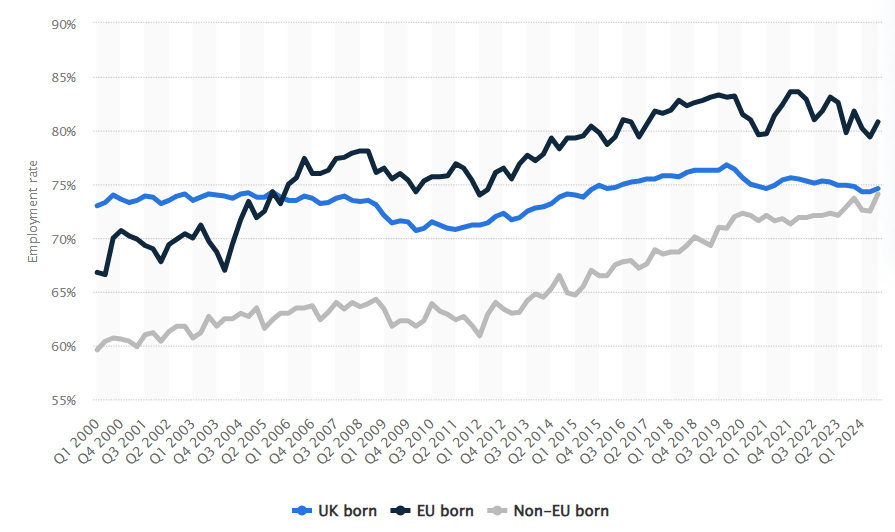The United Kingdom, with its rich history, diverse culture, and growing economy, has always been a leading source of employment for individuals worldwide. People from overseas bring a wealth of talent, energy, and expertise that contribute significantly to the UK’s workforce. However, keeping track of the job market can take lots of work. In this blog, we’ll explore various job opportunities for migrants in the UK.
Employment rate of UK: 1st quarter 1997 to 2nd quarter 2023

Source: Statista.com
1. Healthcare
The NHS, the UK’s public health service, is the country’s largest employer and always needs skilled professionals. This demand has provided numerous opportunities for foreigners to contribute significantly to the public health sector. Gaining the necessary qualifications and recognition can take time, but the effort is well worth it, given the rewards and job security. Here’s a detailed look at the role of foreign nationals within the NHS:
– General Overview: Most NHS staff in England are British, with around 83.5% holding a British nationality. However, a significant 16.5% are foreign nationals. This shows that approximately 220,000 out of 1.4 million staff identify with a non-British nationality. NHS has added people from 200 different nationalities to the workforce.
– Breakdown by Nationality: Among foreign nationals, Asian nationals, including countries like India, Pakistan, and the Philippines, make up 7.2%. EU nationals, such as Romanians, Spanish, and Polish, account for 5.3%. Other nationalities like Nigerian, Zimbabwean, and Ghanaian also have a significant presence.
Source: NHS Digital, Supplementary information on NHS staff by nationality and region
– Trends Over Time: The representation of Asian nationals within the NHS has grown from 4.0% in 2016 to 7.2% in June 2022. African nationalities also increased from 1.8% to 3.1% over the same period. However, EU nationalities peaked at 5.6% in 2017 and decreased slightly to 5.3% by June 2022.
– Regional Variations: London boasts the highest proportion of non-UK NHS staff at 28%, followed by the East of England at 22%. In contrast, the North East and Yorkshire have the lowest at 9%. It’s worth noting that the proportion of foreign doctors (32.6%) and nurses (23.7%) is considerably higher than the average for all staff (16.5%).
– Post-Referendum Changes: After the 2016 referendum, EU staff numbers in the NHS seemed to rise from 58,702 in 2016 to 70,735 by 2022. However, this rise might be due to improved record-keeping, not necessarily more EU staff joining.
Source: NHS Digital, Workforce Statistics June 2022
Even though it’s hard to get exact numbers about hiring from other countries, we know this: immigrants are crucial for UK healthcare. They work hard not just in health but in other areas, too. If you’re considering a job in security, places, like Get Licensed, can help you with training, no matter where you’re from.
Most Common Nationalities of NHS Staff, June 2022
Source: NHS Digital, NHS Workforce Statistics June 2022, HCHS staff in post summary tables
2. Information Technology (IT)
The UK’s tech industry thrives, offering roles from software development to network administration. London’s Silicon Roundabout and other tech hubs nationwide consistently look for talent, and having international experience can be a significant advantage. A significant portion of tech immigrants in the UK originate from Asia, with India being a dominant contributor.
Tech Immigration Overview
In 2022, the UK welcomed 54,000 international tech professionals, marking an upward trend since 2017. Although 2020 witnessed a decline due to global restrictions, the subsequent years displayed a robust recovery in migration numbers.
Current update IT Industry
Despite the growth in the tech sector, there is a notable demand for skilled professionals. Current data indicates over 43,000 job vacancies in IT-specific roles, and a broader search reveals up to 68,000 vacancies in the tech sector.
3. Education
Teaching is a noble profession, and many immigrants find their calling in the UK’s education sector. Whether it’s in primary schools, high schools, or universities, there’s always a demand for passionate educators. Some might need a UK-specific qualification, but many institutions value international teaching experience.
4. Engineering and Construction
The UK’s engineering sector is vast, from civil engineering projects like bridges and roads to the intricate designs of electronics engineers. Similarly, the construction industry offers roles in everything from bricklaying to project management.
- 18% of the UK working population work in engineering, and
- at least 15% of the working population of every region are in engineering jobs.
5. Finance and Banking
London offers numerous finance, banking, and insurance opportunities as one of the world’s financial capitals. Many global firms have their European headquarters in the UK, and they often value international experience. So, if you’ve ever dreamt of working in the busy and demanding finance and banking sector, London is the place to be. It’s not just a British financial hub; it’s global. The opportunities here are vast for immigrants with a background in finance or banking. Many multinational firms in the city specifically value international experience, making it an ideal place for those from abroad to make their mark. With Brexit reshaping the UK’s financial landscape, fresh perspectives are more crucial than ever.
6. Hospitality and Tourism
The UK attracts millions of tourists annually with its historic landmarks and vibrant cities. This sector is always in need of diverse talents. You’ll find many doors open if you’re an immigrant with hospitality experience or speak multiple languages. From running a quaint B&B in the Cotswolds to guiding tours in various languages in London, your global perspective can be a unique selling point.
7. Retail and Sales
The UK’s retail sector offers many opportunities, from shop assistants to management roles. While London is the hub, cities like Manchester, Birmingham, and Edinburgh also have thriving retail scenes. Shopping is a universal language, and the UK’s retail scene is diverse and dynamic. For immigrants, this sector offers both entry-level roles and opportunities for growth. Undoubtedly, you could be a perfect fit if you’ve a talent for sales and a multicultural touch.
8. Agriculture and Fishing
While it might seem traditional, there’s always room for innovation. Immigrants with experience in modern farming techniques or sustainable fishing practices can find the UK’s agricultural scene rewarding. In particular, regions like Cornwall and Scotland always look for skilled hands. Whether you’re from a farming background in Europe or have fishing experience from Asia, your skills can find a home here.
Based on data from the ONS, in 2021, the industry accounted for roughly 0.03% of the UK’s overall economic production and about 5% of the wider agriculture, forestry, and fishing industry. In 2020, Scotland produced nearly 70% of the economic output for the fishing and aquaculture sector.
Source: United Kingdom; Office for National Statistics (UK); 2023
Source: Census 2021 from the Office for National Statistics
Security Industry:
The security sector in the UK is a rapidly growing industry and offers many opportunities for immigrants. With urban centres and events constantly needing safety and monitoring, there’s a persistent demand for well-trained security personnel. From busy city nightlife to major sporting events and concerts, door supervisors ensure everyone’s safety. Similarly, with the increased emphasis on surveillance and crime prevention, there’s a rising need for adept CCTV operators. For immigrants, this industry offers job openings and a chance to climb the ladder. One can easily work in this industry after passing the SIA course and holding an SIA badge. Indeed, migrants are taking the lead in the security sector and still can find multiple gigs every other day. Additionally, multilinguals can be an asset in this sector, allowing for better communication in diverse situations.
UK Security Guards Count: Q4 2021 to Q1 2023 Estimate
Source: Statista.com
Get Licensed: Your Gateway to the UK’s Security Sector
If you’re considering a career in the security industry, Get Licensed is your go-to platform. We offer security training courses tailored to the UK’s security standards, ensuring you’re well-equipped for your role. With years of experience training thousands of professionals, Get Licensed is a trusted name in the industry. Whether you’re looking to be a security guard, door supervisor, or CCTV operator, they have a course tailored for you.
To Sum Up
While the UK offers vast opportunities across various sectors, it’s essential to be prepared. Understand the qualifications required, network effectively, and be persistent. Remember, every job, be it in healthcare, IT, or security, requires dedication and passion. Choose a career that aligns with your interests and strengths, and you’ll succeed in the UK.
P.S.: Before embarking on any job journey in the UK, always ensure you know the legal requirements and visa regulations. Having the proper permissions and qualifications to work in the UK legally is crucial.


Leave a Reply